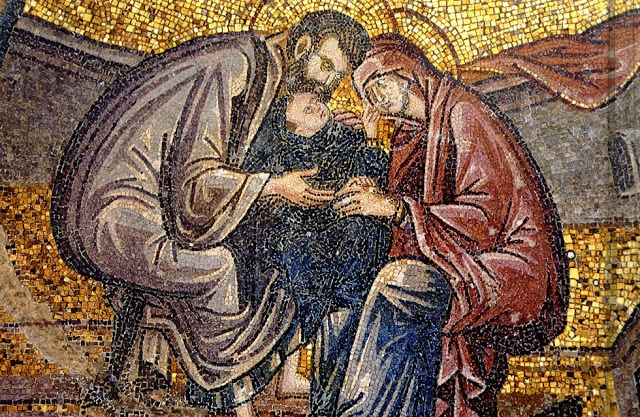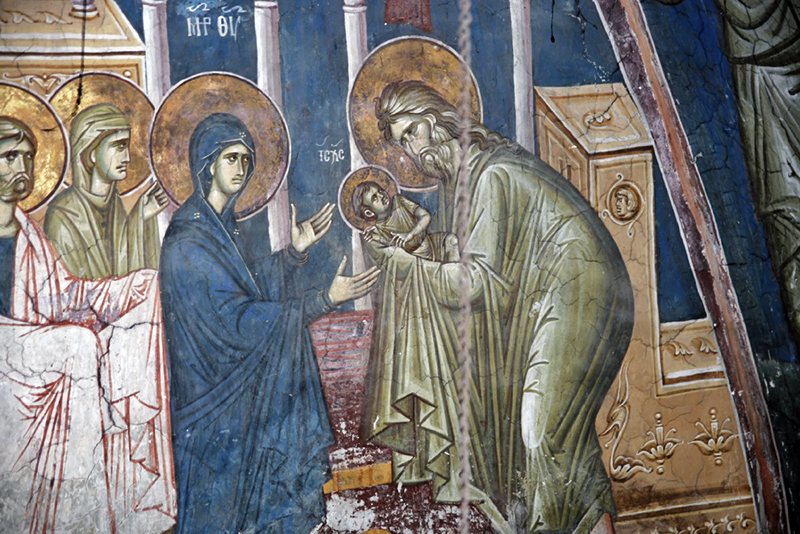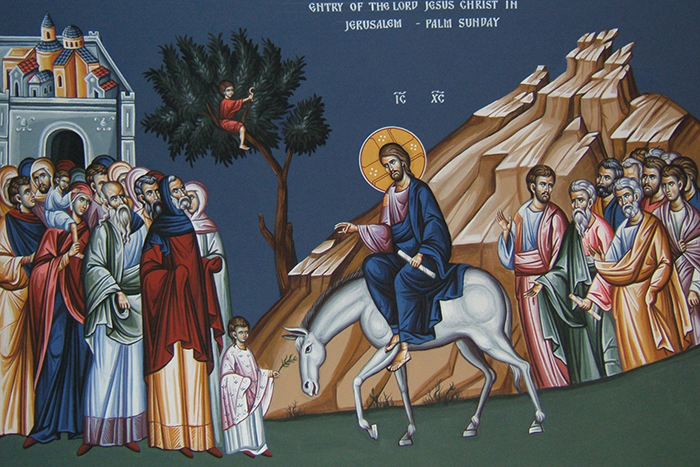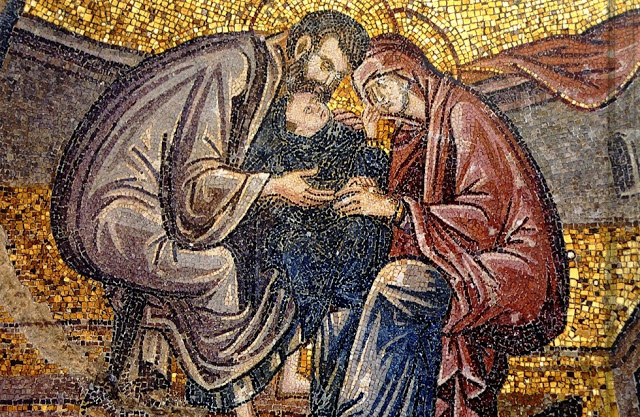
The History of our salvation as well as God’s plan about the humankind is rooted in a long and private tragedy of one ancient Jewish family. How fascinating it is! And how much it can tell us about God, our Creator, and about how He invisibly cares about us, how He is always with us and especially how He sympathize us even if we do not notice it.
Joachim and Anna were barren. They had no children. If today everything is so confused in people’s minds and their perception of life and the world is so distorted, then it was completely different in ancient Judea in the very beginning of our Christian era. To have children meant and still means today to have God’s blessing, God’s patronage as well as it is the symbol of God’s promise of the ever-lasting life on earth. Children are the future support and joy for their parents. Joachim and Anna had no such joy, although they were pious people who always tried to comfort God with their prayers and good deeds in His holy Name. In spite of that, they had no children – that visible sign of God’s mercy – until their very old age. We cannot even say how much sorrow and how much disdain they faced from other people. Perhaps, those sorrows taught Joachim to pray wholeheartedly and hope only for God and taught Anna to be humble before God and to be especially kind to people in need.
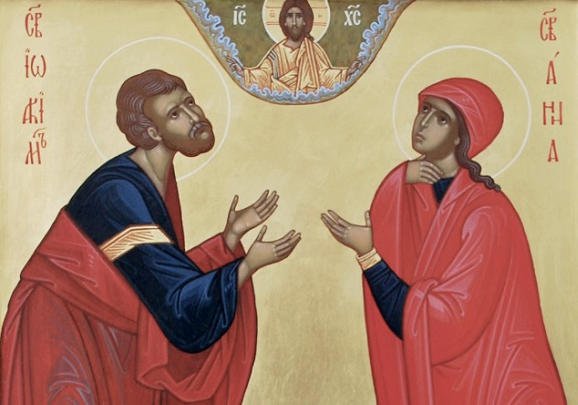
The Lord was preparing a worthy vessel for the future Messiah, and that is why He tested them and called them to joy: “In this you greatly rejoice, though now for a little while, if need be, you have been grieved by various trials, that the genuineness of your faith, being much more precious than gold that perishes, though it is tested by fire, may be found to praise, honor, and glory at the revelation of Jesus Christ” (1 Peter 1:6-7).
According to the Church tradition, Joachim was going to bring sacrifices to God in the Solomon’s temple, but the archpriest refused to accept it since he considered Joachim to be unworthy in the face of God. Joachim could not stand that shame and went to the desert to cry and pray to God there. At the same time, Anna was mourning her dishonor, too. And then, at the highest point of their prayer, the highest point of their hope, the Lord sent His angel to them to announce about the greatest mercy to those people and, what is more, to announce that they are chosen by God and that they are free from the seal of dishonor since that moment.
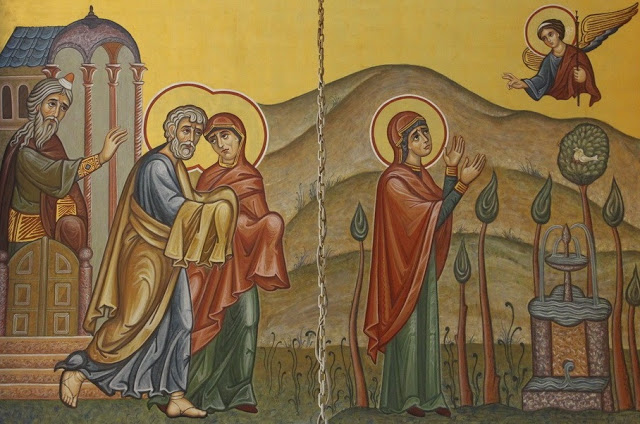 |
| Joachim and Anna leaving the temple |
How sincerely Joachim rejoiced! How happy Anna was! They met each other near God’s temple being full of joy and happiness. To show their gratitude, they decided to devote their child to God.
So, the tragedy of one ancient Jewish family, about which we would never know if only their tragedy did not turn into joy, became the joy for the whole world. In nine months after the moment Joachim and Anna had met near the temple, when all the terms given by God passed, the very Ladder would be born, which Jacob saw in his dream; the great Temple of God with the closed gates, which prophet Ezekiel saw in his visions; the Queen about whom king and prophet David mysteriously told us. That was the Ladder, by which God, the King of the World, the Father of the future age was supposed to descend to earth and save the world from darkness with His light. That was the Temple that would accept the Lord, the Creator of the sky and earth, and that would weave for Him flesh from its pure and royal blood. That was the Queen who would sit forever at the right hand of Her Son and after whom other virgins would come to Him, following the example of Her pious life.
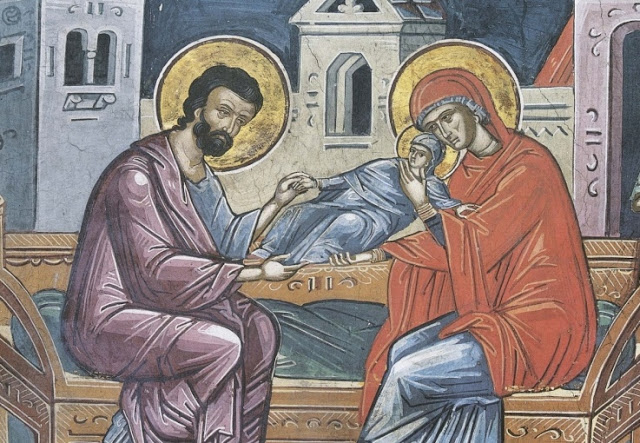
The One would be born, Who would set the beginning of our salvation. She would give birth to the Messiah, Who would bring the lost Adam back to God.

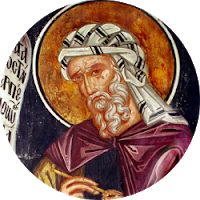
The word of St. John Damascene:
Joachim and Anne were the parents of Mary. Joachim kept as strict a watch over his thoughts as a shepherd over his flock, having them entirely under his control. For the Lord God led him as a sheep, and he wanted for none of the best things. When I say best, let no one think I mean what is commonly acceptable to the multitude, that upon which greedy minds are fixed, the pleasures of life that can neither endure nor make their possessors better, nor confer real strength. They follow the downward course of human life and cease all in a moment, even if they abounded before. Far be it from us to cherish these things, nor is this the portion of those who fear God. But the good things which are a matter of desire to those who possess true knowledge, delighting God, and fruitful to their possessors, namely, virtues, bearing fruit in due season, that is, in eternity, will reward with eternal life those who have laboured worthily and have persevered in their acquisition as far as possible. The labour goes before, eternal happiness follows. Joachim ever shepherded his thoughts. In the place of pastures, dwelling by contemplation on the words of sacred Scripture, made glad on the restful waters of divine grace, withdrawn from foolishness, he walked in the path of justice. And Anne, whose name means grace, was no less a companion in her life than a wife, blessed with all good gifts, though afflicted for a mystical reason with sterility. Grace in very truth remained sterile, not being able to produce fruit in the souls of men. Therefore, men declined from good and degenerated; there was not one of understanding nor one who sought after God. Then His divine goodness, taking pity on the work of His hands, and wishing to save it, put an end to that mystical barrenness, that of holy Anne, I mean, and she gave birth to a child, whose equal had never been created and never can be. The end of barrenness proved clearly that the world’s sterility would cease and that the withered trunk would be crowned with vigorous and mystical life.

Reflections in the Church tradition:
Kontakion — Tone 4
By Your Nativity, O Most Pure Virgin, Joachim and Anna are freed from barrenness; Adam and Eve, from the corruption of death. And we, your people, freed from the guilt of sin, celebrate and sing to you: The barren woman gives birth to the Theotokos, the nourisher of our life!
End of Part I
To be continued…

